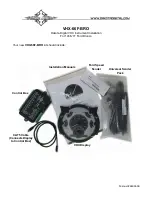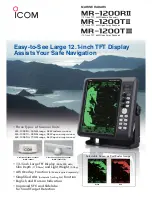
MKIV Ocean Unit 3
29
Problem
Probable Cause
Solution
Sail will not furl or
is difficult to furl.
Jib halyard is wrapping around headstay because
angle between mast and and halyard is too shallow
See installation instructions regarding optimal halyard angle. It may be necessary
to mount a halyard restrainer on front of your mast to hold halyard to rear.
Jib halyard is wrapping around the headstay
because halyard swivel is too low.
See installation instructions regarding optimal halyard swivel height. A wire pendant
may be needed at head of sail to raise halyard swivel to proper height.
Jib halyard is too tight.
Ease jib halyard.
Foils riding on turnbuckle.
Raise foils. See adjusting turnbuckle on page 21
Foils too high, binding on swage eye.
Lower foils until clear. See adjusting turnbuckle on page 21.
Spare halyard is wrapping in sail as it furls.
Secure spare halyards away from furling headstay by flipping them behind spreaders
Salt or dirt in bearings.
Flush bearings frequently with fresh water and detergent solution.
Furling line tangled in drum.
Overrides are best prevented by using a 7402 ratchet block as the last furling line lead to
maintain proper drag on line while unfurling.
Stop knot catching.
Make sure knot is a single overhand and is pushed up inside drum.
Sail full of wind.
Luff completely before furling or reefing.
Sail flogging too much.
Release a short length of sheet, pull some furling line and repeat.
Jib sheets are not free.
Free jib sheets.
Foil out of drum assembly.
Reinstall foil in drum assembly and tighten clamp screws.
No wraps of furling line on drum.
Remove sheets. Rotate stay wrapping as much furling line on drum as possible.
Lineguard assembly has slipped down.
Tighten line guard assembly screws securely.
Line through 7402 ratchet backwards.
Rerun line.
Halyard swivel installed upside down.
Remount swivel correctly.
Sail will not unfurl
or will not unfurl
completely.
Jib halyard is wrapping around headstay because
angle between mast and halyard is too shallow.
See installation instructions regarding optimal halyard angle. It may be necessary to
mount a halyard restrainer on front of your mast to hold halyard to rear.
Jib halyard is wrapping around the headstay
because the halyard swivel is too low.
See installation instructions regarding optimal halyard angle.
Foils riding on turnbuckle.
Raise foils. See adjusting turnbuckle on page 21.
Foils too high, binding on swage eye.
Lower foils. See adjusting turnbuckle on page 21.
Jib halyard is too tight.
Ease jib halyard.
Spare halyard is wrapping in sail as it furls.
Secure spare halyards away from furling headstay by flipping them behind spreaders
Salt or dirt in bearings.
Flush bearings frequently with fresh water and detergent solution.
Furling line is not free.
Free furling line.
Sail will not furl
completely.
Insufficient furling line on drum.
Remove sheets. Rotate stay, wrapping as much furling line on drum as possible.
Too much line on drum.
Adjust amount of line on drum or change position of forward lead block to allow line
to roll evenly on drum.
Spare halyard catching in sail as it furls.
Move halyards away from furling headsail as above.
Headstay rotates in
jerks or elliptically.
Insufficient tension on headstay.
Tighten headstay and/or backstay to eliminate sag in headstay.
Sail does not stay
furled.
Sail not furled tightly on stay.
Maintain drag on sheets while furling.
Furling line not secure.
Secure furling line.
Sail will not go up.
Luff tape will not go into groove.
Check luff tape for fraying.
Check luff tape size.
Sail catching at prefeeder.
Flake sail more loosely on deck.
Dirt in groove.
Clean groove.
Sail will not raise
completely or luff
will not tension.
Halyard swivel is hitting end stop.
Luff of sail is too long and must be recut.
Angle between halyard and mast is too sharp
and halyard is pulling too much to the rear.
Halyard must be routed from a point higher on mast. This may require that any halyard
turning blocks aloft be replaced or sail shortened.
Sail will not
come down.
Halyard is wrapping on headstay.
Angle between headstay and halyard is too shallow and must be optimized per installation
instructions.
Halyard swivel off foil.
Sail luff too long or foil is too short or low and must be lengthened or raised.
Ultravoilet cover rolls
up inside of sail.
Furling line is wrapped on drum in wrong direction.
Remove sheets. Pull line to remove all furling line from drum. Turn stay to rewind line on
drum in opposite direction. Line guard and cowling alignment may need to be adjusted.
Line jams between guard
and plastic spool plate.
Line is not led through windows.
Pull line through enclosed window.
Troubleshooting
Warranty
https://www.harken.com/en/worldwide-limited-professional-customer-warranty/
or call, write, email or fax Harken, Inc.,
Pewaukee, WI USA




































